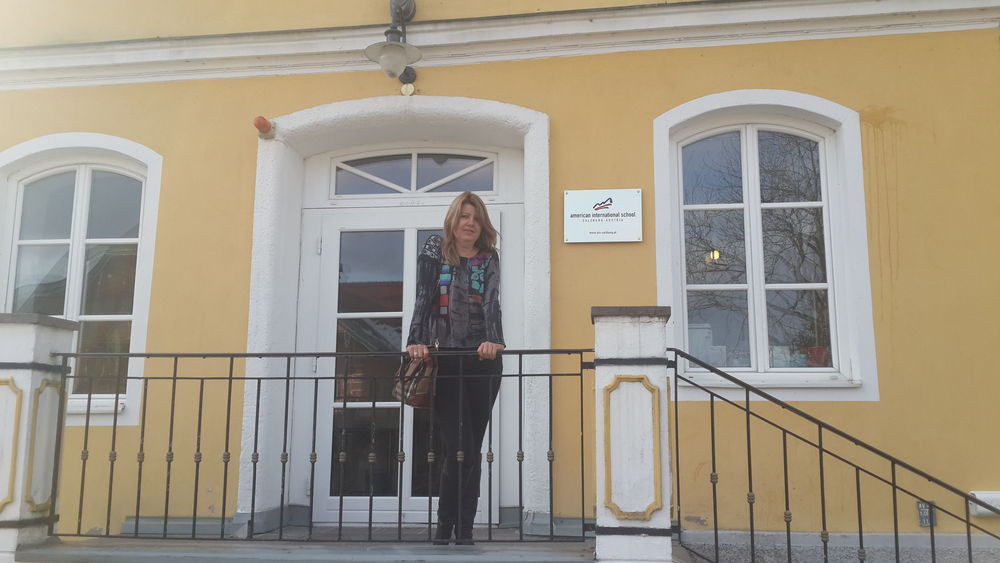Visit to AIS-Salzburg
03.10.173491

During my last European tour to boarding schools, I visited Salzburg. Small international school American International School Salzburg located a ten-minute drive from the city center. The school campus is not impressive. It is a four-story building, first floor of which occupy the school and dining room, the rest of the buildings is given for the student dorms. There is one more one-store building on the grounds, which has science labs and classrooms. There are some playing fields and that is all of the campus.
The school has about 100 students, 20 of them are day students: some Austrians and some foreigners who live with my parents in Salzburg. Main part of the students lives within the school dorms, which occupy the top three floors, one floor for boys, and two floors for girls. The maximum capacity of boarding houses is 84 students (42 boys and 42 girls). Each year the school receives 25-30 new students, depending on the number of graduates, which varies from 15 to 30, and expelled students. There are quite enough staff for 100 students: about 20 teachers and 8 tutors.
AIS-Salzburg takes students from grade 7 to grade 12 and it offers American school program. Students of grade 11th and 12th may take some subjects on the advanced level. AIS offers Advanced Placement in mathematics, physics, chemistry, geography, history, languages and literature: German, English, French and Spanish. Students can also study Psychology at advanced level, but they won’t be able to sit test in the school.
For the admission to the school, students are required to have good grades, motivation to study and low Intermediate or above English. However, if a student enters high school with Intermediate level of English, he would need time to improve his English first and misses part of the program, which is not possible to catch on in high school. The other disadvantage is that students are not allowed to learn other languages before they get Advances English, including German.
Yakym and Polina were in school for the second year when I had my visit and were both in the 11th grade.
Interview with Yakym
Y: the school is not so good, we do not like the rules and there are lots of control here.
The school is small, teaches are good and like studying here, but the infrastructure of the school is not the best. The food is fine, mainly Austrian cuisine. Motivation is higher than in Ukraine, because more likely you can get into a good University. I don't like history and geography because they are taught based on America. All books are also American. We study the history of all countries, but emphasis is on America. Math here is much easier than in Ukraine. Many international students choose to take an advanced course in mathematics because for our students it is not difficult. There is not enough German at the school. At the beginning, I had low English and began to learn German only one year later. I want to enter the University of Vienna, which offers the courses in German. If I can’t bring my German within a year and a half to B2 level I would require at least a semester to study at the Foundation Department of University of Vienna.
At first, it was very hard, I did not have enough English, but now I have caught up and it’s much easier. It is easy to study German here as there are 5 lessons a week. You plan your lessons individually, depending on what and at which level you want to study. SAT is in 12th grade, you have test right in the school, somewhere before the New Year, and is not difficult, and most students passes it. Students can be expelled from school mostly for the discipline: there are three warnings and after the third you can be sent home for a week, after forth – you would be expelled.
In the autumn all the seniors went for a week in Romania on volunteering program to help build houses in the village. We were helping the builders: mixed concrete, put bricks, covered the roof. We lived in a big house two people in a room. Adults lived in the same house. There were voluntaries from different countries: Americans, British, Germans, Japanese — all helped to build houses.
L: Now tell me, where do the students go after school.
Y: Most of them go to America, many stay in Vienna or enter Universities in different countries, even in Italy.
L: I saw the classes and boarding houses, there is a playfield on the campus. But how it is generally with the sport.
Y: There is not much sport offered in the school, a few, who are engaged into the sport sections, visits them outside the school twice a week, who choose the other activities, then they have only one day for sport for 2 hours. The school has a very small gym, the sport ground is used for volleyball, basketball and football, and all other sports we select we have to take in the local complexes. Some weekend we do activities such as climbing. Five times per the year we go to the ski resorts, the program includes a trip for a day with a coach and ski lifts. Students only need to rent or have their own equipment.
L: Do you know why your friends chose this school.
Y: mostly on the recommendation of someone who studied here or agencies advice. There are many students from Odessa, but most of the students in the school are from Russia and Bulgaria. About 10% of Austrians - all day pupils, and several people from other countries.
Interview with Polina:
L: Do you like the school, what are the living conditions, what do you do after school.
P: The first year I missed my home but then I got used. Now I really like it and have much higher performance than at the last school. The school here is small and the teachers help us a lot with learning. We live in double rooms, boys cannot enter our flor, it is impossible, everything is monitored by cameras and caregivers. Floor is cozy, has a seating area, rooms are also good. After classes, I go to the gym, which is extra to school sport or engaged in school sports clubs.
L: Where are you going to study after school?
P: I haven't decided on the University, but I'm going to study business in America. We almost all go either to America or to the universities of Vienna.


















